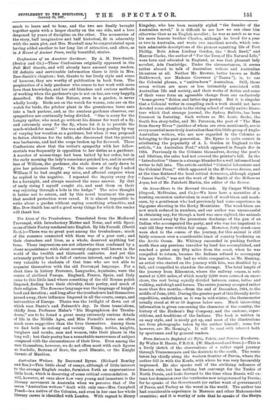The Lives of the Troubadours. Translated from the Mediteval Trovencal,
with Introductory Matter and Notes, and with Speci- mens of their Poetry rendered into English. By Ida Parnell. (David Nutt.)—There was no great poet among the troubadours; much of the romance connected with them was of a poor sort ; and their characters and lives, as a whole, deserved anything but fame. These impressions are not otherwise than confirmed by a closer acquaintance with about seventy singers well known in the world of the twelfth and thirteenth centuries. And yet this extremely pretty book is full of curious interest, and ought to be very valuable to students of that time who are not able to acquaint themselves with the old Provençal language. For a short time in history Provence, Languedoc, Aquitaine, were the centre of civilised Europe. England, France, Spain, and Italy came to this little land where something of the old Roman polish lingered, finding here their chivalry, their poetry, and much of their religion. The Romance language was the language of knight- hood and devotion; and long after the troubadours had themselves passed away, their influence lingered in all the courts, camps, and universities of Europe. Theirs was the twilight of dawn out of which rose Dante's and Petrarch's day. In these translations, chiefly from Professor Mahn's "Die Biographieen der Trouba- dours," are to be found a great many extremely curious details of life in the Middle Ages, and Miss Farnell's notes are often much more suggestive than the lives themselves. Among them we find both m motony and variety. Kings, nobles, knights, burghers and monks, men and women, take their places in the long roll; but their poetry has a remarkable narrowness of subject compared with the circumstances of their lives. Even among the men themselves, however, we do not often meet with such figures as Sordello, Bertran of Born, the good Blacatz, or the Knight Savarie of Mauleon.


















































 Previous page
Previous page